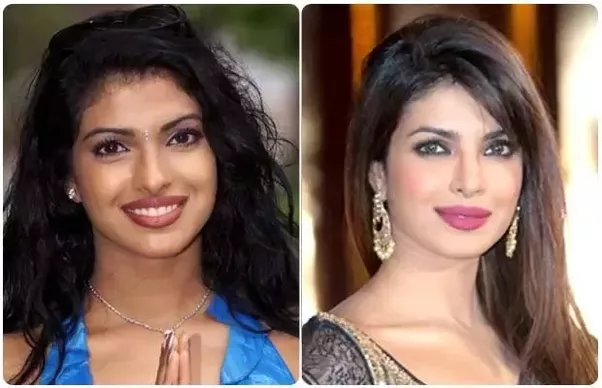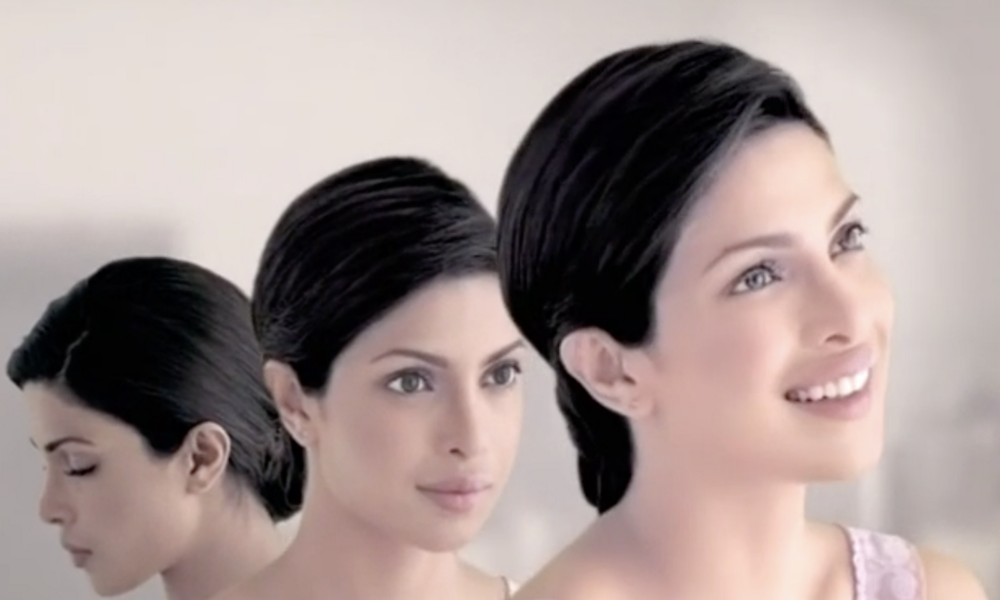
So if you haven’t heard yet, The Cut ran an article calling Priyanka Chopra a global scam artist and then later had to take it down due to social media backlash. It was very obviously biased against Chopra as it is extremely sexist to imply that a highly successful woman like her, who has all the money and fame in the world already, needs to scam and trap a white American boy to make it in Hollywood. Chopra doesn’t need any help in that department, she is richer, more successful and more famous than Nick Jonas, without a doubt (the wedding gives you all the hints you need). Serendipitously, Forbes listed Chopra as one of the 100 most powerful women in the world for 2018 right after this article came out, proving Chopra’s point. But what team Chopra, her new family and all the citizens of America don’t know is that Chopra is also a highly successful perpetrator of colorism, racism, and bigotry in her own country.
What is about to follow is merely a curated assortment of historical events and not an attempt to discredit Chopra’s successes or vilify the entire female population. I’m a proud feminist who believes in celebrating women and their successes, but I strongly believe that any movement to empower the oppressed, is incomplete without the ability to productively criticize ourselves, recognize our demons and correct our mistakes. This will be my compassionate attempt at bringing to light the injustices that Chopra directly endorsed and profited from, and how celebrities like her should not be worshipped as icons, because it justifies colorism, racism, and discrimination.
Skin Lightening
It all started in the year 2000, when Chopra won the Miss World beauty contest after naming Mother Teresa as the most successful living woman on earth, long after her death. To the relief of many, Chopra had some melanin in her skin, unlike all the light-skinned women who usually won Miss India titles because dark skin was demonized by beauty companies looking to sell skin lightening products. Right after that, Chopra started acting in Bollywood movies, which was a standard career path followed by many beauty pageant winners. But the Bollywood Chopra didn’t look like the Chopra who won Miss World. Altering your looks is also pretty standard in the entertainment industry and it is a matter of personal choice, so to each his own. The only relevant detail here is that Chopra’s skin was now many shades lighter.
First Problematic Endorsement: Ponds White Beauty (2008)
After perfecting her look, Chopra crushed Bollywood. She attained the peak of Bollywood success in 2008 when she starred in the critically acclaimed movie “Fashion” that bagged her the National Award for Best Actress. While on this proverbial peak, Chopra starred in a theatrical five-part commercial for a skin lightening product called “Ponds White Beauty.” The timing of this is important, and it should underline the fact that she didn’t really need the money and wasn’t a naive struggling starlet who didn’t know better. This is the ad:
Racist TV ads for Pond's "White Beauty" skin cream featuring faux-feminist celeb Priyanka Chopra http://t.co/6x6mzLhcSp
— Club des Cordeliers (@cordeliers) May 30, 2015
tl;dr: Girl is dark-skinned, loses her boyfriend, she applies Ponds “White” beauty, becomes “white” and wins her ex-boyfriend back.
Second Problematic Endorsement: Garnier Light Beauty (2012)
But she didn’t stop at just one brand. As recently as 2012, just before she made her Hollywood debut, Chopra endorsed another big brand of skin lightening creams: Garnier Light Beauty. This time, with a less in-your-face message, compared to Ponds White Beauty because Indians were slowly waking up to the problematic discrimination propagated by these ads.
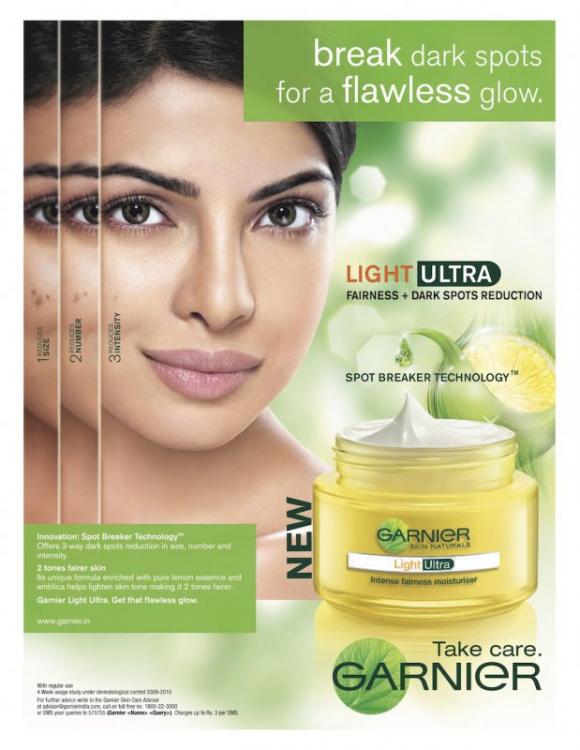
Moreover, it wasn’t like this bigotry was the norm that she subscribed to out of passivity. Many morally-sane Indian actors and actresses had already called out these skin lightening products and declined endorsement deals with these companies. But at the wise age of 31, Chopra decided to pocket millions from yet another brand willing to pay, encouraging skin color based discrimination and intentionally destroying the confidence of millions of dark-skinned Indians.
Defending her Endorsements (2014)
And she didn’t even stop there. When asked about these endorsements, she continued to defend her choice of endorsing skin lightening creams in interviews saying that she chose her endorsements very carefully, and only chose to endorse Ponds White Beauty because it didn’t make false promises of making someone white “overnight” and the cream also gives you a “pinkish glow.”
So the only differentiating factor for her to choose this “whitening” cream over others was that they didn’t falsely advertise the time it took to produce results. But implying that dark-skinned women needed to become “white” to find love was completely ok with her and was a part of her thoughtful and intelligent endorsement strategy of only choosing “brands that are premium” that she can associate/resonate with.
Hollywood Break and Changing her Stance to Fit the Market
Chopra then met Anjul Acharia, who was looking for an Indian star to launch in the American music industry. The drop-dead gorgeous Chopra could also dance and sing so it was probably a no-brainer to pick her as the Indian who could finally ace the crossover to western media. But of all the things she could sing about, she chose to sing about being “exotic, hotter than the tropics,” trying to cash in on the sexist and racist trope of labeling foreign women exotic, to treat them as objects and trophies.
Then in 2015, Chopra made her first American TV debut and found great success as the leading lady in the ABC show “Quantico” where she was being marketed as the ground-breaking brown lead of a prime time American TV show. After some backlash about her response denying that the show was feminist (a stand she adopted in India for popularity as Bollywood loved to bash feminism), she probably realized that it was uncool to bash feminism or brown skin now that she was trying to break into the American market where she was being positioned as the brown feminist female lead.
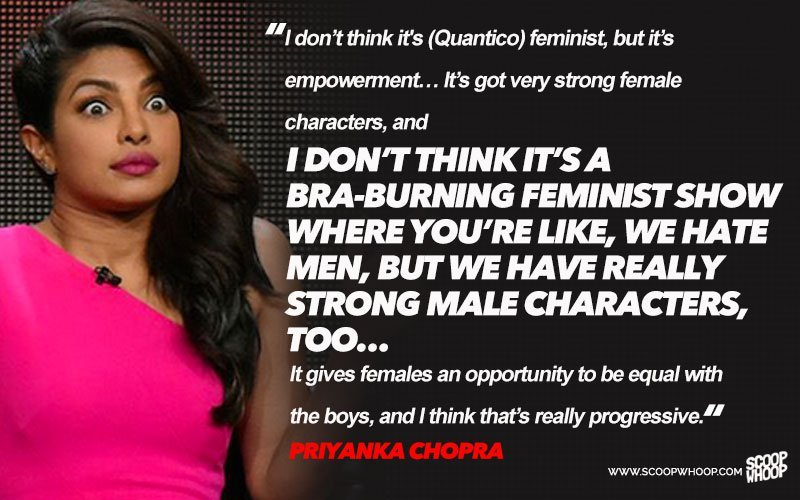
Chopra then launched what seemed like an aggressive marketing campaign to become a brown, woke feminist in the media. The same woman who co-wrote the lyrics “I’m feeling so exotic/I’m hotter than the tropics” was now a proud feminist who couldn’t even stand the phrase “woman of color.” The same woman who aggressively endorsed colorism and played the “white” superior woman in India was now using the dark skin card to play the victim.
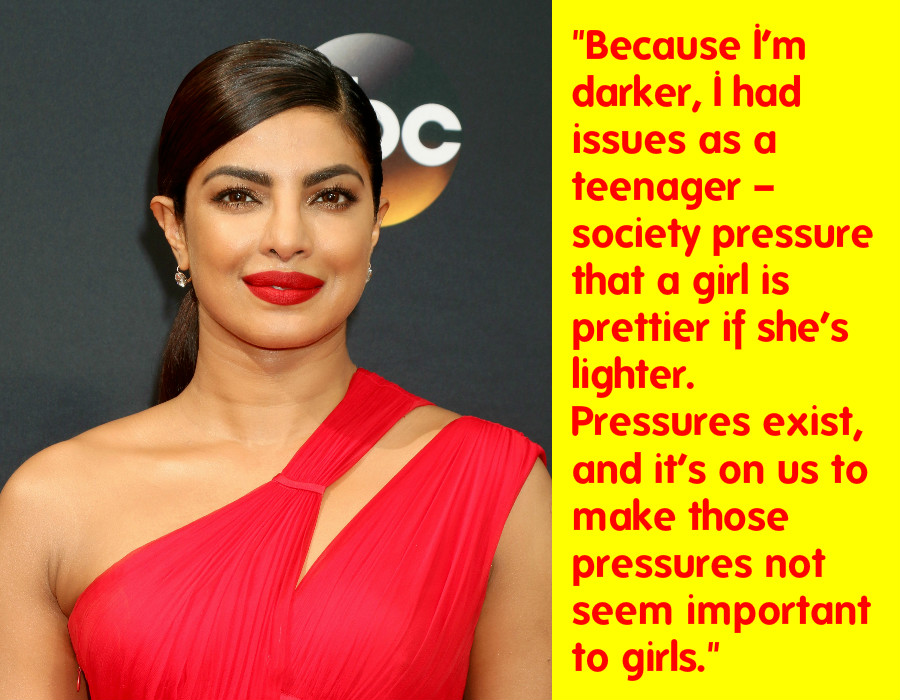
Chopra’s Non-Apology About Endorsing Skin Lightening (2017)
Finally, in 2017, someone from Vogue caught her dodgy endorsement of skin lightening creams in their interview research and asked her about it. Chopra, fully familiar that berating dark skin would not fly in America, then responded with a non-apology saying, “Oh shit! What did I do?” and said that she did that ad when she was in her early twenties, implying that it was one innocent mistake when she was young and naive.
Why I Don’t buy Chopra’s Non-Apology
There are many reasons why I don’t buy her non-apology. First, out of all the celebrities promoting color discrimination, Chopra is the only repeat offender, endorsing multiple brands. As explained earlier, it was not one innocent slip up, but big multi-year endorsement deals with different brands spanning TV, print and online marketing spots for over a decade.
Second, when Chopra endorsed those ads, she wasn’t a naive, struggling starlet living under a rock, just believing the oppressive beauty standards being spoon-fed to her by the media, as she suggests. She was a successful, jet-setting globetrotter since her teenage years who had been exposed to beauty of all skin colors. She was privileged and rich enough to attend school in North America where she was introduced to a world where dark skin was not considered ugly. She also participated in the Miss World competition where she was introduced to beauty queens from all the countries around the world which included numerous women with dark skin. If she claims she didn’t know any better through all those years, was she secretly judging all the dark-skinned beauty queens as ugly and undeserving?
https://youtu.be/wzkXpGg9koY
Chopra and her General Hypocrisy About Other Social Causes
If you have been following Chopra’s interviews long enough, you’ll know that she often changes ethics as she sees fit, siding with the person/company/cause that will amount to the most profit or fame.
Anti-racism and donning Asian face
As someone who vocally wants to take down racism and break all barriers, Chopra put on prosthetic single lids to look East Indian for her role as an Indian boxer Mary Kom in 2014, which is basically the derogatory Asian equivalent of blackface. Such moves can end careers in Hollywood, but the Indian media is more forgiving about racism and casteism, especially when it comes to powerful celebrities. Chopra got away with this, with only some small independent blogs calling her out on this racist move.
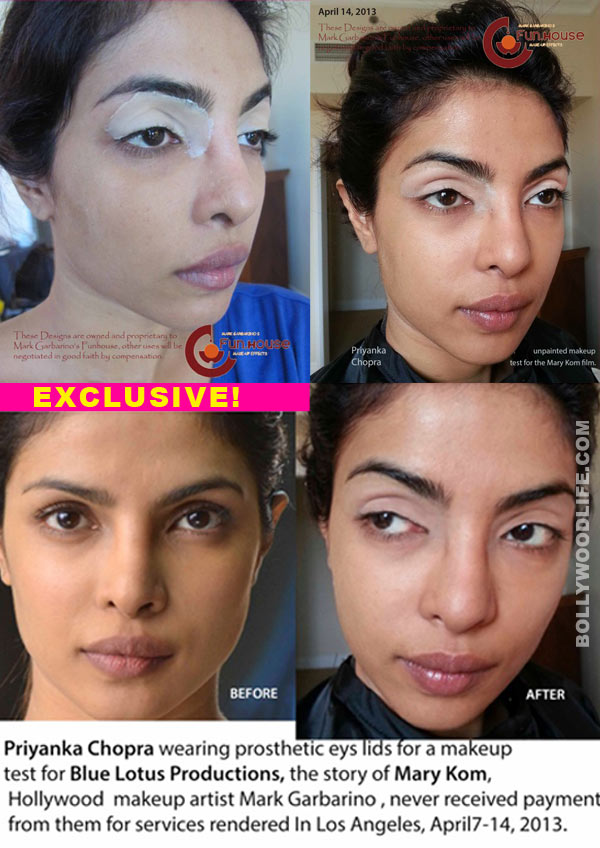
Advocating pollution control and indulging in a fireworks show
Chopra also endorsed a campaign called BreatheFree for Cipla, which encouraged people to not burst any crackers during the Indian festival of Diwali to allow asthmatics like herself to breathe freely and help control the rising pollution levels in India. But just two months later, her wedding featured the most extravagant fireworks display, irking many eco-activists. North India has been battling severe pollution in recent years and the fireworks are neither a custom in Indian weddings nor a common feature in weddings planned by educated families. It was just a lavish display of wealth and power.
Guys pls don’t burn firecrackers, Priyanka Chopra is asthmatic pic.twitter.com/PJOry2HldG
— Amit Kumar ( Modi Ka Parivar ) (@AMIT_GUJJU) December 1, 2018
After telling us to not use firecrackers during #Diwali, #priyankachopra has a massive fireworks display during her wedding! What a hypocrite!! Things these celebrities do for money ? #Pollution #Hypocrites https://t.co/wR2FhpRUjr
— Aniket Pargaonkar ?? (@aniketsp) December 2, 2018
Advocating animal rights and using elephants as accessories
Chopra also advocates for animal rights but used elephants at her wedding as accessories. These elephants are abused in captivity and unlike in the case of using horses for the baraat, there is no Indian custom or ritual tied to it.
So in summary, Chopra twists her ethics to fit whatever story she wants to convey which makes it hard to trust her. She openly lied about the magnitude of her skin lightening endorsements and most importantly never really apologized for it.
Colorism: A Global Evil
Colorism is a worldwide problem that propagates the European beauty standard of light skin, enslaving people of color to an impossible dream of becoming “white.” This impossible dream of becoming a white person is a way to keep people perpetually unhappy with themselves and that is the key to profitability in the beauty industry. An impossible beauty standard keeps people in a loop of self-loathing. Self-loathing will make people more susceptible to buying beauty products that will supposedly help them reach the impossible dream. But the dream is truly impossible and can never be achieved, so they get stuck in that self-loathing cycle forever. In other words, they become lifelong customers. It is a never-ending trap.
Colorism quietly feeds racism and casteism but stays under the radar because it is more deep-seated and systemic. Colorism, as a word, doesn’t even pass spell check sometimes because no one is using it. But the skin lightening market is projected to triple to $31.2bn (£24bn) by 2024, according to a report released in June 2017 by the research firm Global Industry Analysts. In Nigeria, 77 percent of the country’s women use skin-lightening agents compared to 59 percent in Togo, and skin lightening creams are becoming a common staple in every woman’s skincare routine in most of Asia, too. So as this industry triples in size, it is high time we started thinking and talking about the evils of colorism.
Skin lightening creams use bleaching agents that cause cancer. Countries like Ghana have banned them for the health concerns associated with using these products. But in India, and in a lot of other countries, skin lightening is still an extremely profitable, thriving business. In 2014, the Advertising Standards Council of India banned adverts depicting people with darker skin as inferior, but the products are still being marketed as bringing a healthy glow, reducing dark spots etc. instead of direct alluding to dark skin as inferior. The psychological effects of these products run deeper and affect culture in a way that is hard to control with laws. People are still being brainwashed to believe that dark skin is inferior which encourages and normalizes discrimination for generations. To overthrow something of that magnitude and power, we need a revolution.
Why I Care so Much
As a deeply dark-skinned woman from India, the skin color discrimination endorsed by Bollywood celebrities has had a direct impact on my life. I was ridiculed and harassed about my dark skin every day—by classmates, relatives, and strangers on the street. Everybody was brainwashed and just believed in this discriminatory beauty standard that dark skin was ugly and worthless and dark-skinned women would never find jobs or love. Relatives would gift me fairness creams and ask me to bleach my skin, and people would proactively warn my parents that nobody would marry me.
When someone as powerful as Chopra, who was supposed to champion women’s causes as Miss World, endorses the message that having dark skin makes you worthless, it condones the discrimination that people like me had to battle all their lives. It takes away your fundamental human right to equality because it implies that you are inferior because of your color. People feel justified in ridiculing you and you accept discrimination as the price you have to pay for having “flawed” dark skin. You become a modern day slave, accepting your fate as the inferior mortal who doesn’t deserve any better.
I was depressed and suicidal all through my formative childhood and teenage years because I saw no way out of this oppression. Everyone kept reminding me that I wouldn’t find love or success if I didn’t change my dark skin, and my mind would keep looping the thought that my life was pointless. I spent every waking day, and every prayer wishing for death because that seemed to be the only way to escape a world where I was worthless because of my skin color. Luckily, the universe sent some of the kindest friends my way through college and I was fortunate enough to be able to work my way out of my depressive spirals and build a normal sense of self-worth. There might be others who might not be lucky enough to find support.
The fight against colorism has just started in India, and so celebrating the perpetrators like Chopra negates all the hard work that people are putting into fighting it. The Dark is Beautiful campaign started in 2009 by Kavitha Emmanuel and endorsed by actor-director Nandita Das has been doing grassroots work to dismantle colorism conducting workshops for school students to discourage skin color based discrimination. Actor Abhay Deol made a series of incriminating social media posts calling out all the actors who enabled racism by endorsing skin lightening products. Nidhi Sunil, a stunning, internationally published, dark-skinned Indian model, openly spoke about the discrimination she had to face as a dark-skinned model in Indian media. Indian culture magazines like Homegrown are showcasing personal stories of dark-skinned women who had to live through colorism to promote empathy and remove the stigma around dark skin.
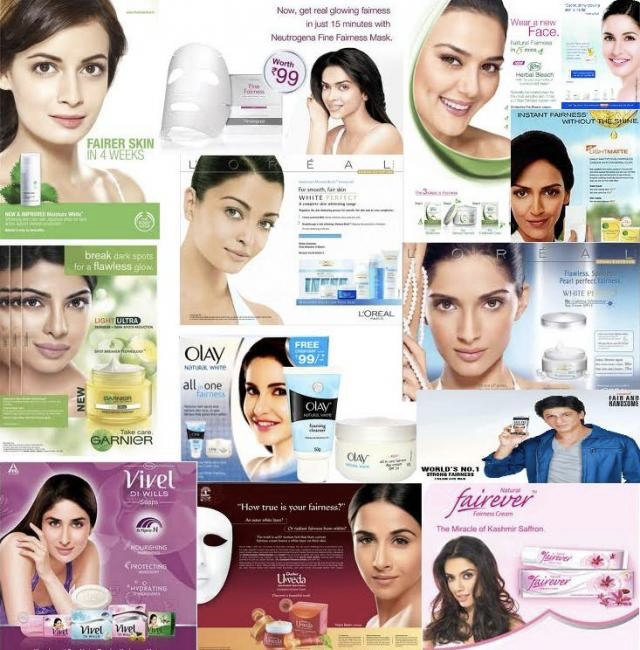
My life was deemed so worthless by these oppressive beauty standards promoted by Chopra and her fellow racist colleagues, that I almost killed myself. My self-worth was so low that I was sorry for my existence, sorry for being visible and sorry that the world had to go through the misfortune of seeing my dark face. I almost didn’t live to tell this, so I cannot live in a world where anyone has to go through that ever again. There is nothing more I want than to put an end to this injustice. I cannot stay silent about this anymore because like Desmond Tutu said, “If you are neutral in situations of injustice, you have chosen the side of the oppressor.”
I see the world telling me to celebrate my bigoted oppressor Chopra as my hero, but I cannot respect someone who promoted discrimination against my race and my color for money. I respectfully and compassionately dissent. I hope Chopra can understand how her actions have promoted discrimination and negatively impacted the lives of millions of dark-skinned people, and I invite her to help me understand her ethics.
